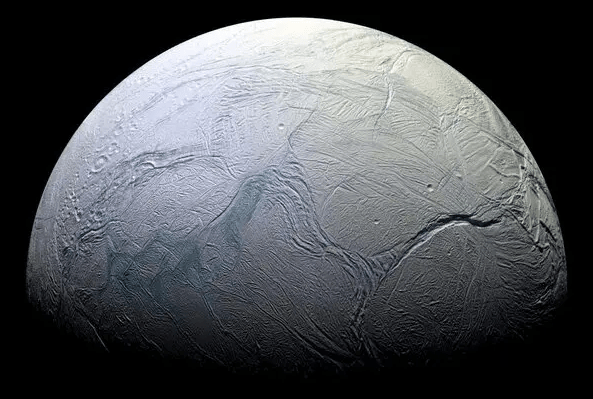Scientists have discovered suitable conditions for life on Saturn’s moon (video)

A new scientific study has shown that the pH level of the subsurface ocean on Saturn’s icy moon Enceladus may be favorable for life. There are microorganisms on Earth that survive in a similar environment. About this informs Space.
20 years ago, the Cassini spacecraft first recorded water vapor geysers erupting from fissures on the surface of Enceladus. Since then, scientists have established that an ocean of liquid water is hidden under its ice shell. In a new study, it was possible to analyze the data of the NASA probe and determine the pH level of this ocean. According to the conclusions, the environment in the ocean of Enceladus, although not very comfortable, is still potentially suitable for microbial life.
The researchers found that the pH ranged between 10.1 and 11.6, higher than previous estimates of 8 to 9. By comparison, the pH of water in Earth’s oceans is around 8. This means that the environment on Enceladus is significantly more alkaline. Scientists determined this level of alkalinity by studying the composition and distribution of phosphate minerals in the ice particles of geysers.
Increased alkalinity indicates the active interaction of water with silicate rocks on the ocean floor, which contain iron, magnesium and sodium. As a result of such processes, sodium hydroxide is formed, which reacts with CO₂ and creates an extremely alkaline environment. As scientists joke, under such conditions, human tooth enamel would simply dissolve. Despite this, there are microorganisms in nature that can survive in similar conditions, which does not allow us to completely exclude the possibility of life on Enceladus.
According to the researchers, the interaction of water with rocks contributes to the formation of minerals and ions, which hypothetical microorganisms could use as a source of energy. Such organisms, the authors suggest, can exist on the ocean floor.
In addition to water, the ocean on Enceladus probably also contains sodium, chlorine, sodium carbonate, ammonia, and potassium. The researchers also detected high levels of molecular hydrogen (H₂), the same type that is abundant in some of the deepest areas of Earth’s oceans, where life also exists. Scientists emphasize that a new space mission with modern scientific instruments is needed to more accurately study the conditions on Enceladus.





